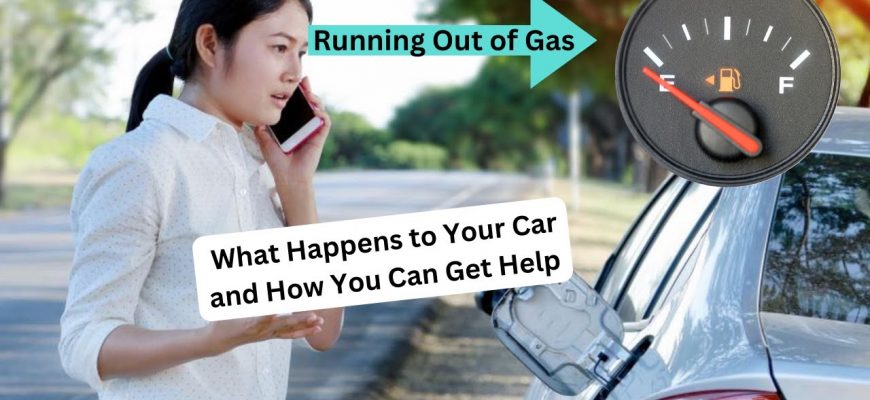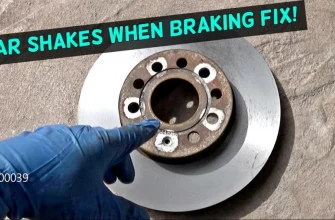Running out of gas in a car is an experience many drivers dread․ It’s not just an inconvenience; it can lead to a series of unfortunate events that can disrupt your day and even jeopardize your safety․ In this article‚ we will explore the various effects of running out of gas in a car‚ from the immediate consequences to the broader implications for vehicle health and driver behavior․
The Immediate Consequences
When your vehicle runs out of gas‚ the immediate effect is that it comes to a halt․ This can occur at the most inconvenient times‚ such as on a busy highway or in an isolated area․ Here are some immediate consequences:
- Stranded Situation: Being stranded can lead to panic‚ especially if you are in an unfamiliar place or at night․ This can create a sense of vulnerability․
- Traffic Hazards: A car that suddenly stops in the middle of traffic can pose a serious hazard to other drivers․ This can lead to accidents and injuries․
- Time Loss: Running out of gas can delay your travel plans significantly․ You may have to wait for roadside assistance or walk to the nearest gas station․
Impact on Vehicle Health
Beyond the immediate inconvenience‚ running out of gas can have detrimental effects on your vehicle’s health:
- Fuel System Damage: When a car runs out of gas‚ it can draw in sediment from the bottom of the fuel tank‚ which can clog the fuel filter and damage the fuel injectors․
- Engine Issues: Continuously running out of gas can lead to fuel pump failure․ The fuel pump relies on gasoline for lubrication and cooling; without it‚ the pump can overheat and fail prematurely․
- Increased Maintenance Costs: The aforementioned issues can lead to costly repairs and increase the overall maintenance costs of the vehicle․
Psychological Effects
The psychological effects of running out of gas should not be underestimated․ For many drivers‚ this experience can lead to:
- Increased Anxiety: The fear of running out of gas can create anxiety‚ especially for long-distance drivers or those who frequently travel in remote areas․
- Change in Driving Habits: After experiencing a gas run-out‚ many drivers may become overly cautious‚ leading to stress while driving․ They may constantly monitor fuel levels and avoid long trips․
Preventive Measures
To avoid the negative effects of running out of gas‚ drivers can take several preventive measures:
- Regular Fuel Checks: Make it a habit to check your fuel gauge regularly‚ especially before planning long trips․
- Fuel Alerts: Most modern vehicles have warning lights that indicate low fuel levels․ Pay attention to these alerts and refuel promptly․
- Emergency Fuel Supply: Consider keeping a small canister of fuel in your trunk‚ especially if you travel through remote areas․
Running out of gas in a car can lead to a myriad of consequences‚ from immediate inconveniences to long-term vehicle health issues․ Understanding these effects and taking preventive measures can help drivers avoid the pitfalls associated with an empty gas tank․ While it may seem like a simple oversight‚ the repercussions can ripple through various aspects of your driving experience‚ affecting not just your schedule but also your vehicle’s longevity and your peace of mind on the road․
While the immediate fallout of a car running out of gas can be frustrating‚ the experience can also serve as a pivotal moment for drivers․ Whether it’s a reminder of the importance of regular maintenance or an opportunity to reassess driving habits‚ running out of gas can lead to a deeper understanding of vehicle ownership and personal responsibility․
Long-Term Behavioral Changes
The experience of running out of gas can trigger lasting changes in a driver’s behavior․ Many individuals become more attuned to their vehicle’s needs․ Here’s how:
- Increased Awareness: After a gas run-out‚ drivers often develop a heightened awareness of their fuel levels․ Frequent checks and strategic planning for refueling become the norm‚ fostering a proactive approach to vehicle maintenance․
- Planning Ahead: Many drivers start to plan their routes with gas stations in mind‚ taking note of locations along their daily commutes or on long trips․ This not only enhances convenience but also reduces the chance of being caught off-guard․
- Fuel Efficiency Mindset: The experience can lead to a focus on fuel efficiency‚ encouraging drivers to adopt more economical driving habits․ This could include reducing rapid acceleration‚ maintaining steady speeds‚ and minimizing idling․
A Lesson in Responsibility
Running out of gas can also serve as a lesson in personal responsibility—both for the vehicle and the driver․ It underscores the importance of:
- Regular Maintenance: A reminder that monitoring fuel levels is just one part of vehicle upkeep․ Regular oil changes‚ tire checks‚ and brake inspections are equally crucial․
- Emergency Preparedness: The incident may prompt drivers to consider what to do in case of a breakdown․ This could involve keeping a roadside emergency kit‚ a charged phone‚ and a plan for contacting roadside assistance․
- Financial Awareness: Running out of gas can also be a wake-up call regarding budgeting for fuel costs․ Understanding fuel consumption and calculating expenses can lead to more mindful spending․
Environmental Considerations
Running out of gas can also have environmental implications․ When cars stall on busy roads‚ they can lead to traffic congestion‚ which in turn increases emissions as vehicles idle․ Additionally‚ the potential for fuel leaks when a car runs out of gas can pose environmental risks․ Therefore‚ maintaining awareness of fuel levels is not just a personal responsibility; it’s a collective one that impacts community well-being․
In the grand scheme‚ running out of gas may seem like a minor inconvenience‚ but it can lead to significant behavioral changes‚ lessons in responsibility‚ and environmental awareness․ Drivers can turn this frustrating experience into an opportunity for growth‚ cultivating better habits that enhance not only their driving experience but also their relationship with their vehicle and the environment․ The next time the fuel gauge dips low‚ remember: this is more than just a warning; it’s a chance to reflect‚ learn‚ and evolve as a responsible driver․
Running out of gas might seem like a minor inconvenience‚ but it can have far-reaching implications that extend well beyond the roadside drama․ In today’s fast-paced world‚ where time is money‚ and convenience is king‚ understanding the repercussions of an empty fuel tank is crucial for all drivers․ Let’s delve deeper into the hidden costs associated with running out of gas‚ highlighting not only the immediate inconveniences but also the broader impacts on your vehicle‚ finances‚ and well-being․
Financial Implications
While the price of gas fluctuates‚ the cost of running out of fuel can quickly add up․ Here’s how:
- Towing Fees: If your vehicle comes to a halt on a busy road‚ you may need to call for a tow truck‚ which can cost anywhere from $50 to $150 or more‚ depending on your location and the distance to the nearest gas station․
- Fuel System Repairs: As previously mentioned‚ sediment can enter the fuel system when you run out of gas․ Repairing or replacing a clogged fuel filter or damaged injectors can be an unexpected expense‚ potentially costing hundreds of dollars․
- Time is Money: Consider the time lost during the ordeal․ Whether you’re waiting for roadside assistance or walking to a gas station‚ the hours spent could translate into lost productivity‚ particularly if you’re late for work or an important meeting․
Impact on Personal Safety
Safety should always be a priority when driving‚ and running out of gas can compromise it in several ways:
- Vulnerability on the Road: Being stranded‚ particularly in isolated areas or during the night‚ can leave you feeling vulnerable․ This situation can lead to increased anxiety and fear‚ especially if you’re alone․
- Increased Accident Risk: A vehicle that runs out of gas can cause sudden stops in traffic‚ leading to rear-end collisions or other accidents․ This not only endangers you but also other drivers on the road․
- Emergency Situations: In cases of extreme weather‚ being out of fuel can exacerbate an already dangerous situation—whether it’s snow‚ rain‚ or extreme heat․
Running out of gas doesn’t just affect your life; it has environmental implications as well:
- Increased Emissions: A stranded vehicle contributes to pollution‚ especially if it idles for extended periods․ Additional emissions come from other vehicles that may be forced to stop or navigate around your car․
- Potential Fuel Spills: If your vehicle runs out of gas in a precarious position‚ there’s a risk of fuel leakage‚ which can harm local wildlife and ecosystems․
Emotional and Psychological Impact
The psychological effects of running out of gas can linger long after the incident:
- Increased Anxiety: The stress of being stranded can lead to heightened anxiety about future trips‚ causing drivers to overthink their fuel levels and routes․
- Loss of Confidence: For some‚ experiencing a gas run-out can shake their confidence behind the wheel․ This may lead to hesitancy in driving or reluctance to take longer journeys․
Strategies for Prevention
To mitigate the risks and costs associated with running out of gas‚ consider these practical strategies:
- Set Alerts: Utilize smartphone apps that track fuel levels and send alerts when it’s time to refuel․ Many modern vehicles also have built-in alerts for low fuel․
- Plan Your Routes: Always be aware of gas station locations along your route‚ especially during long trips․ A quick Google Maps search can help you locate fuel stations in advance․
- Maintain Your Vehicle: Regular maintenance checks can help ensure that your fuel system is functioning properly‚ minimizing the risk of damage should you inadvertently run low on fuel․










This article is a must-read for every driver. The consequences of running out of gas are more serious than most people think!
I had no idea that running out of gas could damage my vehicle so severely. This information is really eye-opening!
The psychological effects discussed in this article really hit home. I often feel anxious about running low on gas, and now I understand why.
Great read! It’s a reminder for all drivers to keep an eye on their fuel levels. I’ll definitely be more cautious now.
This article perfectly captures the stress and anxiety that comes with running out of gas. I can relate to it so much!